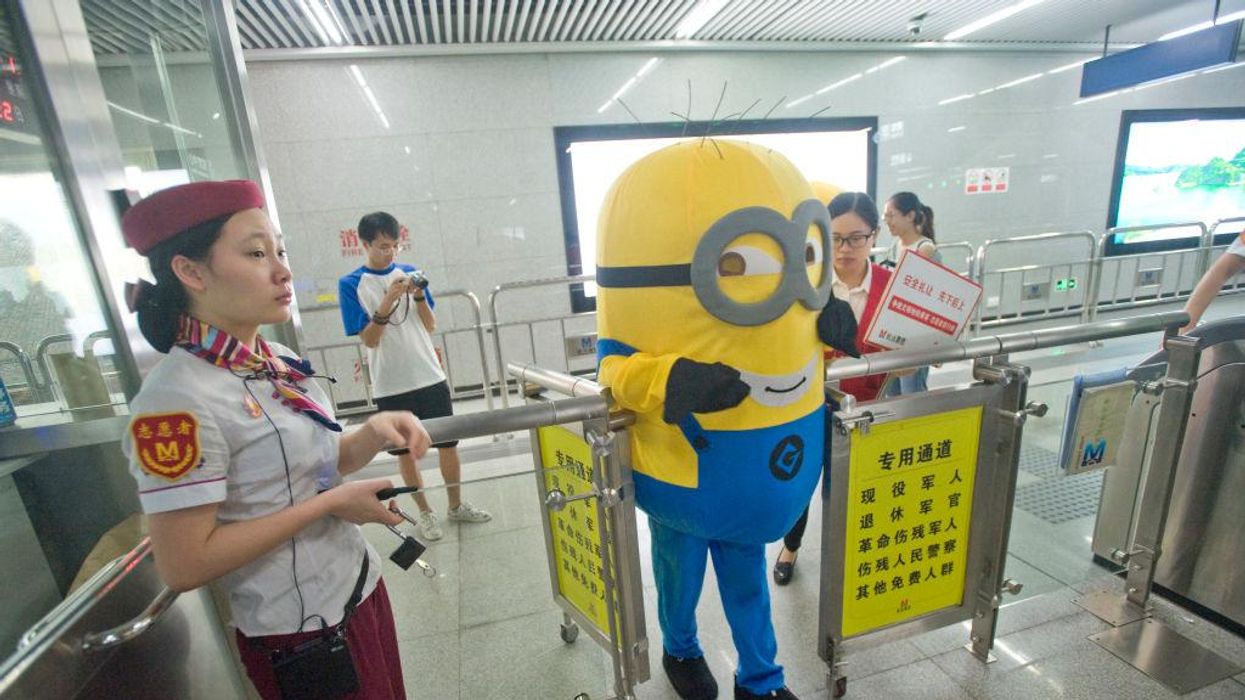
Photo by Visual China Group via Getty Images

Universal Pictures' "Minions: The Rise of Gru" is the latest film in the "Despicable Me" franchise. It debuted in the U.S. on July 1 and was released on August 19 in China. Moviegoers have noticed a significant difference between the ending of the Chinese release of the film and that first played elsewhere in the world last month.
In the international release, the franchise's protagonist and antihero Gru, voiced by Steve Carell, drives off with supervillain Wild Knuckles, who faked his own death in order to escape a prison sentence.
Instead, in the Chinese version that allegedly runs a minute longer, Wild Knuckles remains imprisoned while it's said that Gru "becomes one of the good guys."
This alternate ending is conveyed, in part, through a series of subtitled still images claiming that Wild Knuckles was jailed for 20 years, during which time he started a theater troupe and positively applied his otherwise criminal talents. Gru, who is said to have turned away from a life of crime, devoted himself instead to raising his family. According to the Chinese edit, Gru's "biggest accomplishment is being the father to his three girls."
The BBC reported that the invocation of three children may be linked to the Chinese Communist Party's promotion of its recent three-child policy, an effort to confront the nation's dwindling fertility rate and dearth of women of childbearing age, resulting from half a billion abortions.
While some have criticized the alteration, suggesting that the subtitled slides resemble a PowerPoint presentation, other film critics have taken issue with what they perceive to be infantilization.
"How weak and lacking judgment do they think our audiences are?" asked DuSir, a movie blogger with over 14 million followers on the Chinese social media platform Weibo. He suggested the implication of the censorship was that only Chinese people needed "special guidance and care."
Moviegoers in China are well acquainted with censorship of and alterations to Hollywood films.
In January it was revealed that David Fincher's 1999 film "Fight Club" had also been given a radically different ending. The version made available on the Chinese streaming platform Tencent Video was bereft of its original final scene, where the anarchical antihero kills off his alter ego and then watches skyscrapers explode and the cityscape become engulfed in flame.
In the Chinese edit, the scene was replaced by a caption that reads: "Through the clue provided by Tyler, the police rapidly figured out the whole plan and arrested all criminals, successfully preventing the bomb from exploding. After the trial, Tyler was sent to lunatic asylum receiving psychological treatment. He was discharged from the hospital in 2012."
Communist Chinese censors were evidently opposed to depictions of state impotence and successful anarchy. CNN reported in January that the Chinese publisher of "Fight Club," Pacific Audio & Video Co., is affiliated with state-owned Guandong Radio and Television.
David Fincher responded: "If you don't like this story, why would you license this movie?" Human Rights Watch called the edited result "dystopian."
A slightly less edited version was released in February after the backlash, this time omitting only a scene containing nudity.
The content of Hollywood films is not the only thing changed for Chinese audiences.
In Chinese promotions for Disney's "Star Wars: The Force Awakens," the black protagonist played by John Boyega was shrunk on the movie poster by over 50%. Lupita Nyong’o, another black actor in the film, was cut from the poster altogether and replaced by a enlarged robot.
In 2018, posters promoting "Black Panther" in China had Chadwick Boseman's face covered, which was not the case elsewhere in the world.
Hollywood also has a track record of self-censoring to cater to the Chinese market.
Screenrant reported that the Mandarin, the villain in "Iron Man 3," though an Asian in the comics, was made a white man so as to preclude offense to Chinese censors. The film had multiple scenes involving Chinese actors censored anyway.
The 2012 "Red Dawn" remake was originally going to feature communist Chinese forces as the hostile invaders, but late in development, filmmakers swapped out China for North Korea.
In the James Bond film "Skyfall," the Chinese release censored several scenes where the protagonist defeated men of Chinese origin.